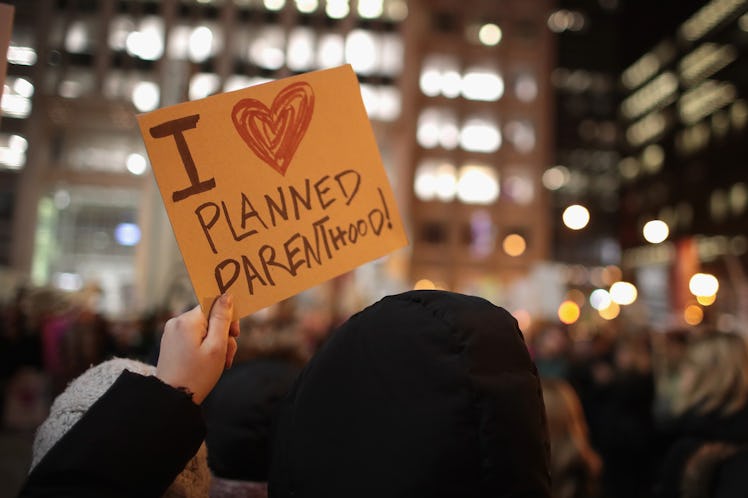
This Is How Cities Are Leading The Way In Protecting Reproductive Rights
A new index report released by the National Institute for Reproductive Health (NIRH) on Wednesday, Oct. 18 ranks the 40 most populous cities on their individual efforts to protect reproductive rights and healthcare on a local level. The index, which ranks San Francisco as the most progressive in its efforts, provides scorecards for each city, top trends in reproductive freedom among these cities, and a "model city" blueprint as a roadmap for cities to improve upon their progress.
Andrea Miller, president of the NIRH, believes in change at the local level, and hopes that this index can be an inspiring tool for cities to see what they are capable of. Miller tells Elite Daily,
This report shows that cities really can be an extraordinary counterweight to the kind of attacks we’re seeing at the federal level to undermine access to reproductive rights and health care. We know that historically, cities are engines for change and innovation, and this reports shows how the 40 most populous cities have taken steps to making reproductive freedom a reality for their residents.
The NIRH is taking a special look at policies on the local level, because they believe that cities have the power to affect policy change on a federal level, by means of starting at the bottom and working its way up, rather than starting at the top. By focusing on residents in a city, they can galvanize support that will build into state support, and so on. Miller has been focused on local change for a decade now with the National Institute for Reproductive Health, which has partnered with 58 organizations on a city level, and 33 organizations in 37 states. The idea for local change influencing federal agendas came when the NIRH began working with former New York Mayor Michael Bloomberg to "improve the conditions of people at the city level and maximize cities to be engines of change and progress."
Rather than attacking from a federal level, Miller has seen the power of grass-root progress by starting local. Miller says,
We saw this locality of cities as being a real opportunity to make change and today, there’s no question that work at the local level is the future. We hope this index as a resource will be a call to action, a source for inspiration, and can be a catalyst.
The three highest-scoring cities on the report were San Francisco, Los Angeles, and New York City, with Chicago and Philadelphia following close behind. However, the index concluded that none of the 40 cities received a perfect score, which would have provided a "model city" that "uses the full extent of its policy and programmatic powers to foster thriving families, support people’s reproductive and sexual health decisions, and destigmatize abortion and contraception."
Cities that fell lower on the index ranking include, Cleveland, Ohio, Richmond, Virginia, and Jacksonville, Florida at the lowest of one star. Despite this low ranking, Miller says the importance of applauding cities with especially contrary political climates for making some sort of progress in a resistant environment. Miller says, “We are confident that every city has done something positive around reproductive rights. The main differentiation is, how much further can they go?"
Miller specifically points to the victories of Saint Paul, Minnesota and Columbus, Ohio, despite being low in ranking. Historically, Ohio has been known for actively pushing for policy against women's reproductive rights. As recent as last December, Governor John Kasich signed an anti-abortion bill that prohibits abortions past 20 weeks, except in the case of serious health risk for mothers, but with no exceptions for rape and incest. With a political climate such as this, Columbus, Ohio has been the most recent city to pass a clinic protection ordinance, which blocks protesters from harassing patients and health care providers as they enter clinics. In that case, the city remained resistant, while the state on a wider level has pushed for an opposing agenda.
In the case of Minnesota, a city took a stand, and the state followed. Mayor Chris Coleman of Saint Paul, Minnesota passed a progressive law for paid family leave in 2015. Shortly after, the state of Minnesota followed suit, passing a state-wide bill ensuring 12 weeks of paid family leave in January 2017. This shows that states can take strides in affecting women's rights, even for states that are historically known for resisting women's reproductive rights, small victories are still victories for all.
The National Institute for Reproductive Health does recognize that factors such as budget and resources affect a city's ability to push new policy. When asked what practical ways cities could improve, Miller includes cost neutral options for progress like "taking a public stand and calling for the enactment of the EACH Woman Act," which was created to fight and dismantle the Hyde Amendment, which prohibits abortions to be funded federally, making women who rely on Medicaid for health care unable to pay. Miller adds that "there are ways in which cities can be the inspiration and driver for change on the federal level. They can make a statement and build towards policy change."
Miller will be visiting San Francisco, among other cities from the index, to discuss innovative ways for partnership with the NIRH and improving even the highest ranking city from the report. While President Donald Trump has plans for a new direction of health care, women's reproductive rights have an undeterminable future, and cities are taking on the responsibility of the resistance.
"The real changes happens when we can partner together. Work at the local level is what moves me, inspires me, and keeps me going forward even in what feels like tremendously dark times," Miller says.